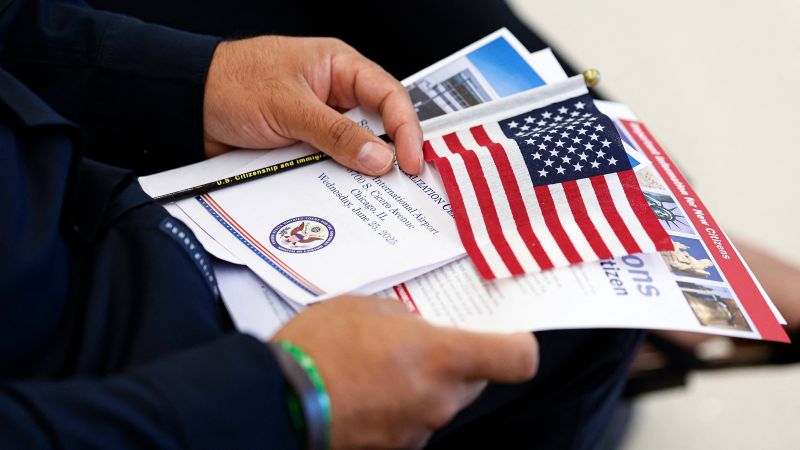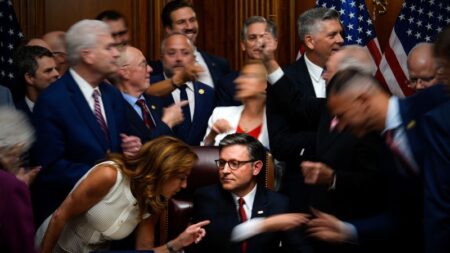The U.S. Department of Justice (DOJ) has long utilized a particular legal mechanism to unearth individuals, specifically former Nazis, who concealed their pasts to gain American citizenship. This law allows for denaturalization—essentially the revocation of citizenship for individuals who have falsified their immigration records or obscured criminal activities in their history. For many years, this authority specifically targeted war criminals and others who posed a significant threat due to their past actions.
However, under the Trump administration, the scope of this power appears to be expanding. A memo released by the DOJ conveyed a significant shift in focus, directing attorneys to broaden the range of individuals subjected to denaturalization proceedings. Now, they are urged to target anyone deemed a potential danger to national security, thereby casting a wide net that could encompass millions of naturalized citizens.
This directive aligns robustly with the Trump administration’s stringent immigration policies. These measures have resulted in an environment where numerous legal immigrants may now find themselves at risk of losing their citizenship status and facing deportation if targeted. The memo specifically highlights individuals with violent criminal backgrounds, gang affiliations, or those involved in drug cartels and fraud as high-priority targets.
While proponents of this broadened focus may view it as necessary for maintaining national security, it has raised substantial concerns among legal experts and lawmakers. Many fear that this expansion could instill a sense of fear among lawful immigrants, particularly those who have openly expressed criticism of the Trump administration. Cassandra Burke Robertson, a law professor at Case Western Reserve University, articulated significant worry about the politicization of citizenship. She remarked that such actions are fundamentally inconsistent with democratic values that should protect citizens and legal residents alike.
The legal frameworks in question date back to the McCarthy period, a time when the U.S. government sought to root out Communist influences amid widespread paranoia. Initially, the laws served to identify those with Communist ties; over the decades, however, the DOJ has predominantly applied them against war criminals. For instance, in 1979, the Justice Department established a dedicated unit responsible for deporting hundreds of Nazi collaborators, with Eli Rosenbaum at the helm, known as the DOJ’s foremost Nazi hunter.
Since then, denaturalization strategies have often fluctuated with the political climate, which included initiatives by past administrations to address issues like identity theft in the naturalization process. The previous Trump administration made attempts to significantly ramp up these efforts, even creating a specialized office within the DOJ to focus on denaturalizations. However, this initiative was quietly dismantled by the Biden administration, which took office with different immigration priorities.
As Trump re-entered the political scene, he sought to reshape federal immigration policy again, directing various agencies such as the FBI and U.S. Marshals to assist in deportation initiatives. The current memo does not reinstate the previous office but outlines an expectation for civil litigation to prioritize denaturalization efforts as permissible by law. This directive hints at potential for pervasive scrutiny on naturalized citizens, prompting concerns regarding the rule of law and the implications for civil liberties.
With the DOJ recently having filed a small number of cases compared to the Trump administration’s much higher numbers, critics argue that the expansive language of the memo could lead to vague and unsubstantiated claims against individuals, allowing for greater flexibility in pursuing denaturalization cases that surpass traditional boundaries.
Furthermore, the rhetoric from Trump and certain allies has generated alarm regarding the potential repercussions for dissenting opinions. The case of New York City mayoral candidate Zohran Mamdani illustrates an emerging trend where political leanings could influence immigration status; concerns over his artistic expressions in rap glorifying figures close to Hamas have led to official inquiries. Such instances raise significant ethical questions regarding the intersection of immigration enforcement and political affiliations.
As these developments unfold, it will be vital to navigate the balance between national security and the rights and liberties of the existing lawful immigrant population, ensuring that due process prevails over political expediency in immigration matters.











